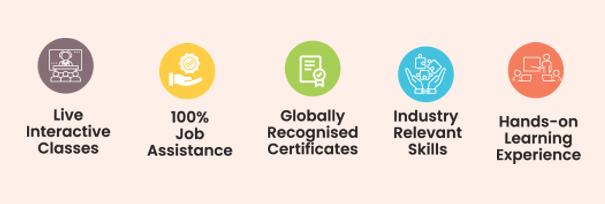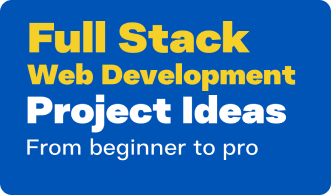We all are a part of a world where technology has literally become as important as fresh air.
Time and again, we find ourselves surrounded by new technological advancements, innovations and what not. We are sure you have come across terms and concepts like MERN, Full-Stack development, and others. We hope now you know many people are doing full stack developer courses and investing in full stack certification.
MERN is one of several MEAN stack variants in which the conventional Angular.js front-end framework is supplemented with React.js. MEVN (MongoDB, Express, Vue, Node) is another variant, and basically any front-end JavaScript framework can function properly.
The MERN stack is a set of technologies that allow for faster application development. It is used by developers throughout the world. The primary objective of using the MERN stack seems to be to develop software that only uses JavaScript. This seems to be due to the fact that now the four technologies that comprise the software system are all JS-based. As little more than a result, if you understand JavaScript (and JSON), visitors can achieve good performance on the backend, frontend, and even database. To know more about it, you can enroll yourself into one out of the best full stack developer courses available in the market.
What does MERN Stand For?
MERN is an acronym that refers to MongoDB, Express, React, and Node, the four important communication technologies that comprise the stack.
MongoDB is a document storage system.
Node.js web framework Express(.js).
React(.js) is a JavaScript framework for the client side.
Node(.js) is the most popular JavaScript web server.
The intermediate (application) tier is made up of Express and Node. Node.js is a well-known and powerful JavaScript backend platform, and Express.js is a computer web framework. Notwithstanding the antecedent you end up choosing, ME(RVA)N is the best way to work with JavaScript and JSON from start to finish.
What is the MERN Full Stack Comprising?
The MERN stack is comprised of four parts. Let us look over companions individual by individual.
- MongoDB
MongoDB is a NoSQL database that is widely used for full-stack development. It provides a flexible and scalable solution for data storage, making it a great choice for modern web applications. Unlike traditional relational databases, MongoDB stores data in collections of documents, which can be easily queried and manipulated. This allows for more efficient and flexible data management, making it a popular choice for web applications.
In the MERN stack, MongoDB serves as the back-end database for the application, storing and retrieving data as needed. This data can then be easily accessed and manipulated by the other components in the stack, such as Express and Node.js, to create a complete full-stack web application.
- ExpressJS
Express is a back-end framework for Node.js that is widely used in full-stack development. It is designed to make it easy to create RESTful APIs and handle HTTP requests and responses. Express provides a suite of tools and features that allow developers to build web applications quickly and easily.
In the MERN stack, Express serves as the back-end framework, handling all the server-side operations such as processing HTTP requests, communicating with the database, and providing data to the front-end. Express is designed to be highly customizable and flexible, allowing developers to build web applications that meet their specific needs.
Express is a popular choice for back-end development because of its simplicity and ease of use. It provides a solid foundation for building web applications, making it a great choice for full-stack development.
- ReactJS
React is a JavaScript library for building user interfaces that is widely used in full-stack development. It is a component-based library, which means that it allows developers to build complex UIs by breaking them down into smaller, reusable components. This makes it easier to develop and maintain large-scale web applications.
In the MERN stack, React serves as the front-end library, responsible for rendering the user interface and handling user interactions. React uses a virtual DOM, which allows for efficient updates to the UI without the need for a full page refresh. This provides a smooth and responsive user experience, even in complex web applications.
React is a popular choice for front-end development because of its performance, versatility, and ease of use. It provides a modern and effective solution for building complex UIs, making it a great choice for full-stack development. Whether you are a beginner or an experienced developer, React provides the tools and features you need to build great web applications.
- NodeJS
Node.js is an open-source, cross-platform JavaScript runtime environment that is widely used in full-stack development. It is built on Google’s V8 JavaScript engine and provides an efficient and scalable platform for building server-side applications.
In the MERN stack, Node.js serves as the back-end runtime environment, allowing developers to run JavaScript on the server-side. This provides a unified programming environment for both the front-end and back-end, making it easier to build and maintain large-scale web applications.
Node.js is a popular choice for back-end development because of its performance, versatility, and large developer community. It provides a fast and efficient platform for building server-side applications, making it a great choice for full-stack development. Whether you are building a small, simple web application or a complex, scalable system, Node.js provides the tools and features you need to get the job done.
Advantages of Using MERN:
There are several advantages of using MERN; a few of them are:
One Language: One of the biggest advantages of using MERN Stack is that it enables developers to use only one language, JavaScript, for both the front-end and back-end development. This reduces the time and effort required to switch between different programming languages and tools.
Open-Source: All of the components of the MERN Stack are open-source, making it possible for developers to access the source code and make changes as required. This makes the stack more flexible and customizable.
Fast Development: React, Node.js, and MongoDB are known for their fast performance, which makes the MERN Stack a great choice for fast and efficient development. This can lead to faster time-to-market and reduced development costs.
Strong Community: The MERN Stack has a strong and active community of developers, which provides a wealth of resources, tutorials, and support. This makes it easier for developers to learn and work with the stack.
Scalability: The MERN Stack is highly scalable and can handle large amounts of data and traffic. This makes it a great choice for building large and complex web applications.
Good for Single-Page Applications: React is well suited for building single-page applications, and combined with Node.js, it provides a seamless experience for the end-user. This makes the MERN Stack a good choice for building fast and responsive web applications.
MERN and Full Stack Development
What do you Understand by Full Stack Development?
Full-stack development is a term used to describe the development of both the front-end and back-end of a web application. Full-stack developers have a comprehensive understanding of all the components of a web application, including the client-side, server-side, and database.
A full-stack developer is responsible for the design, development, and deployment of web applications. This includes tasks such as creating the user interface, writing server-side code, connecting the front-end and back-end, and managing the database.
To become a full-stack developer, you need to have a good understanding of multiple programming languages, frameworks, and technologies. You should be familiar with front-end technologies such as HTML, CSS, and JavaScript, as well as back-end technologies such as Node.js, PHP, or Ruby on Rails. You also need to have a good understanding of databases and be able to work with SQL or NoSQL databases. For that, it is advisable to enroll into a full stack developer course and get yourself a full stack developer certificate.
Full-stack development is a challenging and rewarding career path, as it requires a broad range of skills and knowledge. However, it is also a highly in-demand field, as the demand for full-stack developers continues to grow as the importance of web applications continues to increase. This is why it is advisable to get oneself enrolled in a front end web development training these days.
If you live in India, there are several full stack developer courses in jaipur. You should get yourself into one.
Upside of Using MERN Stack for Full-Stack Development
The MERN stack provides a complete solution for full-stack development, making it easier for developers to build and maintain complex web applications. With its single language, well-supported technologies, scalability, flexibility, rapid development, and large community, the MERN stack is an excellent choice for full-stack development. Whether you are an experienced developer or just starting out, the MERN stack provides a powerful and flexible solution for building web applications. The best way to explore the world of full stack development is getting front end web development training.
Speaking of the advantages of using MERN for full stack development, here are a few points to consider:
- Single Language
One of the main advantages of the MERN stack is that it uses JavaScript as the primary language for both client-side and server-side development. This means that developers only need to be proficient in one language, making it easier to build and maintain web applications. This also reduces the need for developers to switch between different programming languages, which can lead to more efficient and streamlined development.
- Popular and Well-Supported
Another advantage of the MERN stack is that it is based on popular and well-supported technologies. MongoDB is a widely used NoSQL database, Express is a popular web framework for Node.js, React is a popular JavaScript library for building user interfaces, and Node.js is a popular runtime environment for building server-side applications. This means that there is a large community of developers who are using and contributing to these technologies, making it easier for developers to find support and resources when needed.
- Scalability and Flexibility
The MERN stack is also highly scalable and flexible, which is important for full-stack development. MongoDB is a document-based database, which means that it can store data in a flexible and scalable manner. This makes it easy to store and retrieve data, even as the size of the data grows. Additionally, Node.js is known for its ability to handle large amounts of data, making it ideal for building scalable web applications.
- Rapid Development
The MERN stack is designed to be fast and efficient, allowing developers to build applications quickly and easily. React provides a powerful and flexible framework for building user interfaces, while Express and Node.js make it easy to build server-side applications. This results in rapid development, which is important for full-stack development, where time-to-market is often a critical factor.
- Large Community and Resources
Finally, the MERN stack has a large and active community of developers, which makes it easier for developers to find support and resources when needed. There are many tutorials, articles, full stack development courses and forums dedicated to the MERN stack, making it easy for developers to find help when needed. Additionally, there are many open-source libraries and tools that are specifically designed for the MERN stack, which can help developers to build applications faster and more easily. This makes it easy for developers to find resources and support when building web applications using MERN. This includes access to a wide range of tutorials, online forums, and open-source libraries and components, making it easy to find solutions to common problems and to quickly build high-quality web applications.
The MERN stack provides a complete solution for full-stack development that is simple, scalable, flexible, and customizable. While there are other stacks available, MERN provides developers with a single language and set of tools for building web applications, making it an ideal choice for developers who are looking to learn full-stack development quickly and efficiently. Additionally, the large and active community of developers using the MERN stack provides a wealth of resources and support, making it easy to build high-quality web applications with ease.
While MERN is not the only stack available for full-stack development, it provides a number of advantages that make it an ideal choice for many developers. Whether you are a beginner or an experienced full-stack developer, MERN provides a flexible and scalable solution for building web applications that is sure to meet your needs. You can be a part of the full stack development community by getting a full stack developer certificate.
Is MERN enough for Full Stack Developers?
MERN stack can provide enough skills for a full-stack developer, but it may not be enough for all use cases and projects. The MERN stack is a popular and powerful combination of technologies for building modern web applications, and it provides a complete end-to-end solution for full-stack development. However, depending on the complexity of the project and the specific requirements of the business, other technologies or skills may be needed in addition to the MERN stack.
For instance, while MongoDB is a powerful NoSQL database, a full-stack developer may also need to be familiar with other types of databases, such as relational databases or graph databases, in order to handle different types of data storage requirements. Additionally, while React is a popular front-end library, a full-stack developer may also need to have experience with other front-end frameworks or libraries, such as Angular or Vue, in order to handle different types of front-end requirements.
Moreover, a full-stack developer needs to have a good understanding of web development concepts and practices, such as security, testing, deployment, and scalability. This requires a comprehensive knowledge of web development frameworks, tools, and best practices, beyond just the components of the MERN stack. Learning about the vast ocean of front end development comes with a full stack developer course, and if you wish to learn, you should enroll yourself for one.
Hence, MERN stack is a powerful and popular combination of technologies for building modern web applications, but it may not be enough for all use cases and projects. A full-stack developer should have a good understanding of not only the MERN stack, but also other related technologies and skills in order to be able to handle the diverse requirements of different projects and businesses. You will learn more about it in your full stack development course.
Final Word
In conclusion, the MERN stack (MongoDB, Express, React, and Node) is a popular choice for full-stack development due to its ease of use and efficiency. All components of the stack are JavaScript-based, allowing for a unified programming environment. MongoDB serves as the back-end database, Express as the back-end framework, React as the front-end library, and Node as the back-end runtime environment. The MERN stack provides several advantages such as using one language, open-source, fast development time, and a large community for support. However, it is important to consider the specific requirements of a project before deciding on the best technology stack. To begin your journey of full stack development, get yourself enrolled in a full stack developer course.






